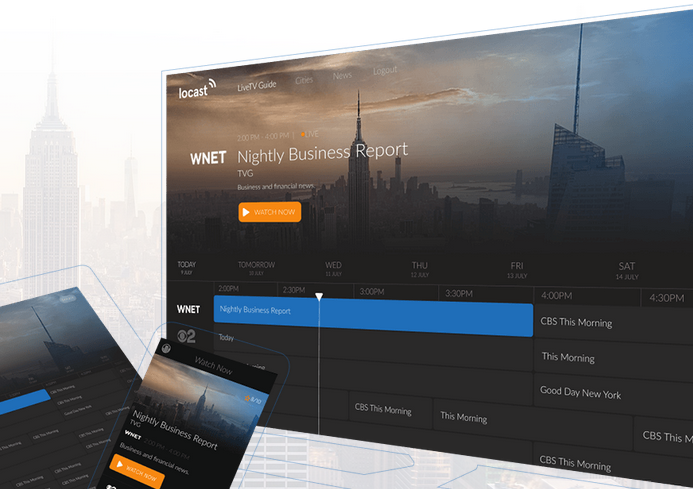Nets Finally Declare Legal War on Free TV Streamer
Follows AT&T promotion, funding of Locast

The smarter way to stay on top of broadcasting and cable industry. Sign up below
You are now subscribed
Your newsletter sign-up was successful
It apparently took some major retransmission-consent blackouts — CBS-DirecTV, Nexstar Media Group-DirecTV — combined with the looming STELAR reauthorization to persuade broadcasters to go after free TV-streaming service Locast.
The Locast service, which has been operating since January of 2018, has recently been billed as an option in retrans blackouts.
The Big Four broadcast networks’ owners and other broadcast companies have filed suit in U.S. District Court for the Southern District of New York, charging copyright violations.
Locast was launched by the Sports Fans Coalition in part as a way to give viewers access to sports programming during such blackouts — via a copyright exemption for nonprofits that retransmit TV-station signals, like the translators that extend TV station signals to hard-to-reach areas. Locast exploited that exception to offer the stations without asking permission or negotiating a fee.
Until now, broadcasters had kept their powder dry, declining to comment or act on Locast even as it expanded to more major markets and stations and grew as a potential tool for multichannel video programming distributors in retransmission disputes.
That broadcast inaction had been in stark contrast to the past response to for-profit services Aereo and FilmOn, which found themselves in court (and Aereo in bankruptcy) after trying to stream TV signals without first negotiating for carriage.
AT&T added the Locast app to its arsenal and promoted it as an option for CBS viewers to get TV stations over the top during a recently-ended blackout, pointing out that football season was fast approaching and referring to the new Locast app on DirecTV Genie and U-verse TV internet-connected receivers.
The smarter way to stay on top of broadcasting and cable industry. Sign up below
AT&T also recently donated $500,000 to Locast, which asks for contributions to cover operating expenses.
Obviously, alternative ways for MVPDs to get stations that don’t involve going to the local bar or switching to an antenna reduces broadcasters’ leverage in retrans negotiations.
One theory as to why TV stations weren’t previously rushing to court had to do with networks charging stations for reverse compensation while also striking deals to put their programming on streaming services, arguably reducing network content’s value to TV stations counting on the ads they place in their versions of the programming. Some stations are OK with getting the extra eyeballs via Locast, which includes their local ads.
But the networks also are powerful members of the National Association of Broadcasters, which said it is squarely behind the suit.
In their suit, network lawyers now say Locast is nothing like the TV translators it purported to resemble. “Locast is not a public service devoted to viewers whose reception is affected by tall building[s] … Instead, Locast’s founding, funding and operations reveal its decidedly commercial purposes,” they said.
Given that the copyright carveout for translators says they must be nonprofit and have no direct or indirect commercial purpose, DirecTV parent AT&T’s $500,000 donation — combined with Locast founder David Goodfriend’s lobbying history with Dish Network, another MVPD — might have given those broadcast lawyers the ammunition they sought. A source familiar with the strategy said it was understood the networks have been actively working on the suit, waiting for the right arguments and deciding where to file.
Veteran attorney Andy Schwartzman of the Benton Foundation, who said broadcasters have abused their free licenses to “coerce” cable operators into overpaying for carriage, believes Locast can make that public-service argument.
“Locast has taken advantage of a provision in the law to give viewers a better and easier way to watch those stations on their TVs, computers, phones and tablets,” Schwartzman said.
Legal issues aside, Adonis Hoffman, chairman of Business in the Public Interest, whose clients have included broadcasters, said that to the degree that Locast does reduce retrans leverage, it could hurt smaller and minority broadcasters more than larger ones. Smaller station groups are more dependent on retransmission dollars than larger, more diversified broadcasters.
It will now be up to a federal judge in New York — and perhaps appeals courts down the line, judging by the years-long Aereo fight — to decide if Locast can keep taking broadcast TV over the top.
Contributing editor John Eggerton has been an editor and/or writer on media regulation, legislation and policy for over four decades, including covering the FCC, FTC, Congress, the major media trade associations, and the federal courts. In addition to Multichannel News and Broadcasting + Cable, his work has appeared in Radio World, TV Technology, TV Fax, This Week in Consumer Electronics, Variety and the Encyclopedia Britannica.

